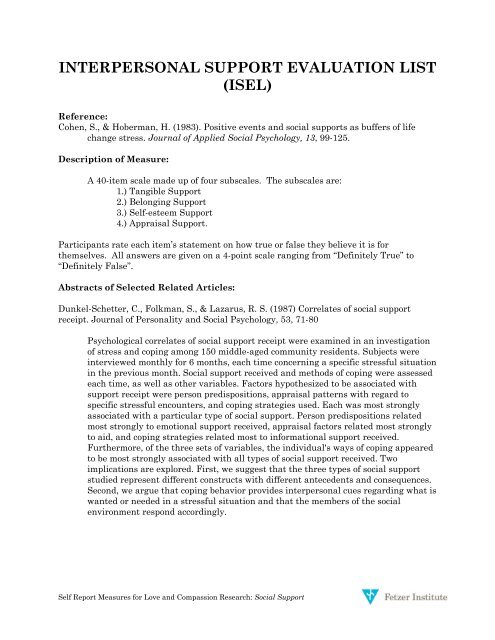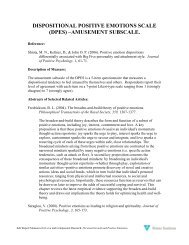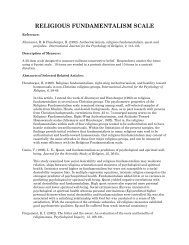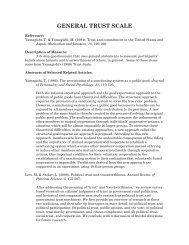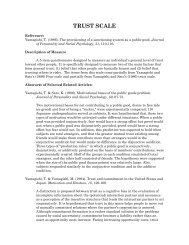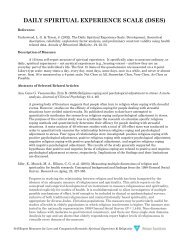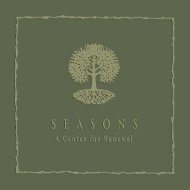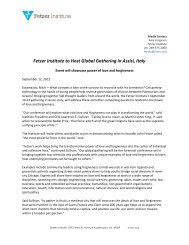INTERPERSONAL SUPPORT EVALUATION LIST (ISEL)
INTERPERSONAL SUPPORT EVALUATION LIST (ISEL)
INTERPERSONAL SUPPORT EVALUATION LIST (ISEL)
Create successful ePaper yourself
Turn your PDF publications into a flip-book with our unique Google optimized e-Paper software.
<strong>INTERPERSONAL</strong> <strong>SUPPORT</strong> <strong>EVALUATION</strong> <strong>LIST</strong><br />
(<strong>ISEL</strong>)<br />
Reference:<br />
Cohen, S., & Hoberman, H. (1983). Positive events and social supports as buffers of life<br />
change stress. Journal of Applied Social Psychology, 13, 99-125.<br />
Description of Measure:<br />
A 40-item scale made up of four subscales. The subscales are:<br />
1.) Tangible Support<br />
2.) Belonging Support<br />
3.) Self-esteem Support<br />
4.) Appraisal Support.<br />
Participants rate each item’s statement on how true or false they believe it is for<br />
themselves. All answers are given on a 4-point scale ranging from “Definitely True” to<br />
“Definitely False”.<br />
Abstracts of Selected Related Articles:<br />
Dunkel-Schetter, C., Folkman, S., & Lazarus, R. S. (1987) Correlates of social support<br />
receipt. Journal of Personality and Social Psychology, 53, 71-80<br />
Psychological correlates of social support receipt were examined in an investigation<br />
of stress and coping among 150 middle-aged community residents. Subjects were<br />
interviewed monthly for 6 months, each time concerning a specific stressful situation<br />
in the previous month. Social support received and methods of coping were assessed<br />
each time, as well as other variables. Factors hypothesized to be associated with<br />
support receipt were person predispositions, appraisal patterns with regard to<br />
specific stressful encounters, and coping strategies used. Each was most strongly<br />
associated with a particular type of social support. Person predispositions related<br />
most strongly to emotional support received, appraisal factors related most strongly<br />
to aid, and coping strategies related most to informational support received.<br />
Furthermore, of the three sets of variables, the individual's ways of coping appeared<br />
to be most strongly associated with all types of social support received. Two<br />
implications are explored. First, we suggest that the three types of social support<br />
studied represent different constructs with different antecedents and consequences.<br />
Second, we argue that coping behavior provides interpersonal cues regarding what is<br />
wanted or needed in a stressful situation and that the members of the social<br />
environment respond accordingly.<br />
Self Report Measures for Love and Compassion Research: Social Support
Taylor, S. E. & Brown, J. D. (1988). Illusion and well-being: A social psychological<br />
perspective on mental health. Psychological Bulletin, 103, 193-210<br />
Many prominent theorists have argued that accurate perceptions of the self, the<br />
world, and the future are essential for mental health. Yet considerable research<br />
evidence suggests that overly positive self-evaluations, exaggerated perceptions of<br />
control or mastery, and unrealistic optimism are characteristic of normal human<br />
thought. Moreover, these illusions appear to promote other criteria of mental health,<br />
including the ability to care about others, the ability to be happy or contented, and<br />
the ability to engage in productive and creative work. These strategies may succeed,<br />
in large part, because both the social world and cognitive-processing mechanisms<br />
impose filters on incoming information that distort it in a positive direction; negative<br />
information may be isolated and represented in as unthreatening a manner as<br />
possible. These positive illusions may be especially useful when an individual<br />
receives negative feedback or is otherwise threatened and may be especially<br />
adaptive under these circumstances.<br />
Cohen S., Mermelstein R., Kamarck T., & Hoberman, H.M. (1985). Measuring the functional<br />
components of social support. In Sarason, I.G. & Sarason, B.R. (Eds), Social support: theory,<br />
research, and applications. The Hague, Netherlands: Martinus Niijhoff.<br />
In the last several years, we have been interested in the role social supports play in<br />
protecting people from the pathogenic effects of stress. By social supports, we mean<br />
the resources that are provided by other persons (cf. Coehn & Syme, 1985). Although<br />
others have investigated and in some cases found evidence for a “buffering”<br />
hypothesis—that social support protects persons from the pathogenic effects of<br />
stress but is relatively unimportant for unexposed individuals, there are difficulties<br />
in interpreting this literature. First, there are almost as many measures of social<br />
support as there are studies. Hence it is difficult to compare studies and to<br />
determine why support operates as a stress buffer in some cases, but no in others.<br />
Second, in the vast majority of work, support measures are used without regard to<br />
their psychometric properties or their appropriateness for the question under study.<br />
For example, studies using measures assessing the structure of social networks (e.g.,<br />
how many friends do you have?) are seldom distinguished form those addressing the<br />
functions that networks might serve (e.g., do you have someone you can talk to<br />
about personal problems?). In fact, in many cases, structural and functional items<br />
are thrown together into single support indices resulting in scores that have little<br />
conceptual meaning. In the context of the limitations of earlier work, we developed<br />
our own social support instrument to study the support buffering process. This<br />
chapter describes the questions we wanted to address, the assumptions we needed to<br />
make in order to develop an instrument that addressed these questions, the<br />
instrument itself, its psychometric properties, and data on the relationship between<br />
support and well-being that has been collected by ourselves and others with this<br />
instrument.<br />
Self Report Measures for Love and Compassion Research: Social Support
Scale:<br />
INSTRUCTIONS: This scale is made up of a list of statements each of which may or may<br />
not be true about you. For each statement check “definitely true” if you are sure it is true<br />
about you and “probably true” if you think it is true but are not absolutely certain.<br />
Similarly, you should check “definitely false” if you are sure the statement is false and<br />
“probably false” is you think it is false but are not absolutely certain.<br />
1. There are several people that I trust to help solve my problems.<br />
____definitely true (3) ____definitely false (0)<br />
____probably true (2) ____probably false (1)<br />
2. If I needed help fixing an appliance or repairing my car, there is someone who would<br />
help me.<br />
____definitely true (3) ____definitely false (0)<br />
____probably true (2) ____probably false (1)<br />
3. Most of my friends are more interesting than I am.<br />
____definitely true (3) ____definitely false (0)<br />
____probably true (2) ____probably false (1)<br />
4. There is someone who takes pride in my accomplishments.<br />
____definitely true (3) ____definitely false (0)<br />
____probably true (2) ____probably false (1)<br />
5. When I feel lonely, there are several people I can talk to.<br />
____definitely true (3) ____definitely false (0)<br />
____probably true (2) ____probably false (1)<br />
6. There is no one that I feel comfortable to talking about intimate personal problems.<br />
____definitely true (3) ____definitely false (0)<br />
____probably true (2) ____probably false (1)<br />
7. I often meet or talk with family or friends.<br />
____definitely true (3) ____definitely false (0)<br />
____probably true (2) ____probably false (1)<br />
8. Most people I know think highly of me.<br />
____definitely true (3) ____definitely false (0)<br />
____probably true (2) ____probably false (1)<br />
9. If I needed a ride to the airport very early in the morning, I would have a hard time<br />
finding someone to take me.<br />
____definitely true (3) ____definitely false (0)<br />
____probably true (2) ____probably false (1)<br />
Self Report Measures for Love and Compassion Research: Social Support
10. I feel like I’m not always included by my circle of friends.<br />
____definitely true (3) ____definitely false (0)<br />
____probably true (2) ____probably false (1)<br />
11. There really is no one who can give me an objective view of how I’m handling my<br />
problems.<br />
____definitely true (3) ____definitely false (0)<br />
____probably true (2) ____probably false (1)<br />
12. There are several different people I enjoy spending time with.<br />
____definitely true (3) ____definitely false (0)<br />
____probably true (2) ____probably false (1)<br />
13. I think that my friends feel that I’m not very good at helping them solve their problems.<br />
____definitely true (3) ____definitely false (0)<br />
____probably true (2) ____probably false (1)<br />
14. If I were sick and needed someone (friend, family member, or acquaintance) to take me<br />
to the doctor, I would have trouble finding someone.<br />
____definitely true (3) ____definitely false (0)<br />
____probably true (2) ____probably false (1)<br />
15. If I wanted to go on a trip for a day (e.g., to the mountains, beach, or country), I would<br />
have a hard time finding someone to go with me.<br />
____definitely true (3) ____definitely false (0)<br />
____probably true (2) ____probably false (1)<br />
16. If I needed a place to stay for a week because of an emergency (for example, water or<br />
electricity out in my apartment or house), I could easily find someone who would put me up.<br />
____definitely true (3) ____definitely false (0)<br />
____probably true (2) ____probably false (1)<br />
17. I feel that there is no one I can share my most private worries and fears with.<br />
____definitely true (3) ____definitely false (0)<br />
____probably true (2) ____probably false (1)<br />
18. If I were sick, I could easily find someone to help me with my daily chores.<br />
____definitely true (3) ____definitely false (0)<br />
____probably true (2) ____probably false (1)<br />
19. There is someone I can turn to for advice about handling problems with my family.<br />
____definitely true (3) ____definitely false (0)<br />
____probably true (2) ____probably false (1)<br />
20. I am as good at doing things as most other people are.<br />
____definitely true (3) ____definitely false (0)<br />
____probably true (2) ____probably false (1)<br />
Self Report Measures for Love and Compassion Research: Social Support
21. If I decide one afternoon that I would like to go to a movie that evening, I could easily<br />
find someone to go with me.<br />
____definitely true (3) ____definitely false (0)<br />
____probably true (2) ____probably false (1)<br />
22. When I need suggestions on how to deal with a personal problem, I know someone I can<br />
turn to.<br />
____definitely true (3) ____definitely false (0)<br />
____probably true (2) ____probably false (1)<br />
23. If I needed an emergency loan of $100, there is someone (friend, relative, or<br />
acquaintance) I could get it from.<br />
____definitely true (3) ____definitely false (0)<br />
____probably true (2) ____probably false (1)<br />
24. In general, people do not have much confidence in me.<br />
____definitely true (3) ____definitely false (0)<br />
____probably true (2) ____probably false (1)<br />
25. Most people I know do not enjoy the same things that I do.<br />
____definitely true (3) ____definitely false (0)<br />
____probably true (2) ____probably false (1)<br />
26. There is someone I could turn to for advice about making career plans or changing my<br />
job.<br />
____definitely true (3) ____definitely false (0)<br />
____probably true (2) ____probably false (1)<br />
27. I don’t often get invited to do things with others.<br />
____definitely true (3) ____definitely false (0)<br />
____probably true (2) ____probably false (1)<br />
28. Most of my friends are more successful at making changes in their lives than I am.<br />
____definitely true (3) ____definitely false (0)<br />
____probably true (2) ____probably false (1)<br />
29. If I had to go out of town for a few weeks, it would be difficult to find someone who<br />
would look after my house or apartment (the plants, pets, garden, etc.).<br />
____definitely true (3) ____definitely false (0)<br />
____probably true (2) ____probably false (1)<br />
30. There really is no one I can trust to give me good financial advice.<br />
____definitely true (3) ____definitely false (0)<br />
____probably true (2) ____probably false (1)<br />
31. If I wanted to have lunch with someone, I could easily find someone to join me.<br />
____definitely true (3) ____definitely false (0)<br />
____probably true (2) ____probably false (1)<br />
Self Report Measures for Love and Compassion Research: Social Support
32. I am more satisfied with my life than most people are with theirs.<br />
____definitely true (3) ____definitely false (0)<br />
____probably true (2) ____probably false (1)<br />
33. If I was stranded 10 miles from home, there is someone I could call who would come<br />
and get me.<br />
____definitely true (3) ____definitely false (0)<br />
____probably true (2) ____probably false (1)<br />
34. No one I know would throw a birthday party for me.<br />
____definitely true (3) ____definitely false (0)<br />
____probably true (2) ____probably false (1)<br />
35. It would me difficult to find someone who would lend me their car for a few hours.<br />
____definitely true (3) ____definitely false (0)<br />
____probably true (2) ____probably false (1)<br />
36. If a family crisis arose, it would be difficult to find someone who could give me good<br />
advice about how to handle it.<br />
____definitely true (3) ____definitely false (0)<br />
____probably true (2) ____probably false (1)<br />
37. I am closer to my friends than most other people are to theirs.<br />
____definitely true (3) ____definitely false (0)<br />
____probably true (2) ____probably false (1)<br />
38. There is at least one person I know whose advice I really trust.<br />
____definitely true (3) ____definitely false (0)<br />
____probably true (2) ____probably false (1)<br />
39. If I needed some help in moving to a new house or apartment, I would have a hard time<br />
finding someone to help me.<br />
____definitely true (3) ____definitely false (0)<br />
____probably true (2) ____probably false (1)<br />
40. I have a hard time keeping pace with my friends.<br />
____definitely true (3) ____definitely false (0)<br />
____probably true (2) ____probably false (1)<br />
Scoring:<br />
Items 3, 6, 9, 10, 11, 13, 14, 15, 17, 24, 25, 27, 28, 29, 30, 34, 35, 36, 39, and 40 are reverse<br />
scored.<br />
Items 1, 6, 11, 17, 19, 22, 26, 30, 36, and 38 make up the Appraisal Support Subscale<br />
Items 2, 9, 14, 16, 18, 23, 29, 33, 35, and 39 make up the Tangible Support Subscale<br />
Items 3, 4, 8, 13, 20, 24, 28, 32, 37, and 40 make up the Self-Esteem Support Subscale<br />
Items 5, 7, 10, 12, 15, 21, 25, 27, 31, and 34 make up the Belonging Support Subscale.<br />
All scores are kept continuous.<br />
Self Report Measures for Love and Compassion Research: Social Support


